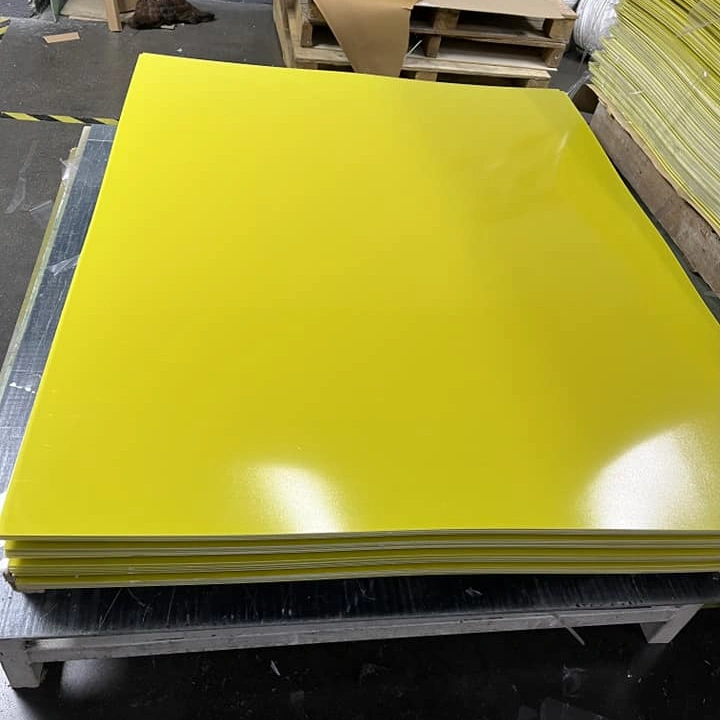When discussing transformer performance, most attention is usually given to electrical efficiency, thermal management, and insulation design. However, one often overlooked factor is mechanical strength. Transformers in operation are constantly exposed to electromagnetic forces, vibrations, and thermal stresses. Under extreme conditions such as short circuits, these stresses become even more severe. Without strong mechanical support, even a slight winding displacement may cause insulation breakdown and serious faults.
This is where the Epoxy FR4 Yellow Sheet demonstrates its indispensable value, ensuring structural stability and long-term reliability in transformers.

Epoxy FR4 is a laminated composite made by impregnating electronic-grade glass fiber cloth with epoxy resin and curing it under high temperature and pressure. The designation “FR” stands for Flame Retardant, and FR4 meets the UL94 V-0 flammability standard, providing reliable fire resistance.
Thanks to the combination of glass fiber’s mechanical strength and epoxy resin’s insulation and bonding properties, FR4 Yellow Sheet has become a preferred choice for transformer support components, insulation spacers, and mechanical reinforcement structures.
Mechanical Advantages of FR4 Yellow Sheet in Transformers
1. High Mechanical Strength and Rigidity
l Flexural strength: With excellent bending resistance, FR4 can withstand the high radial pressures from multi-layer windings and processing stresses, maintaining its shape without deformation.
l Compressive strength: As spacer blocks, FR4 Yellow Sheets secure the windings against axial movement, resisting the intense electromagnetic forces generated during short-circuit events.
2. Excellent Dimensional Stability
FR4 exhibits a low coefficient of thermal expansion, maintaining consistent dimensions across a wide temperature range (−50°C to +130°C or higher). This prevents stress concentration, loosening, or damage to winding enamel insulation caused by thermal cycling.
3. Impact Resistance and Toughness
Although rigid, FR4 maintains a level of toughness that allows it to absorb impact energy. This prevents brittle fracture during transport, installation, or fault conditions.
4. Durability and Fatigue Resistance
Transformers face continuous vibrations during operation. FR4 Yellow Sheet withstands long-term alternating stresses without fatigue cracking or mechanical degradation, ensuring structural integrity throughout the equipment’s service life.
1. Resisting Short-Circuit Forces
During short circuits, windings are subjected to extreme mechanical stress. FR4 Yellow Sheet acts as the first line of defense, preventing deformation or collapse.
2. Reducing Vibration and Noise
By providing a rigid support system, FR4 helps suppress vibration amplitude, which not only lowers noise but also minimizes long-term wear.
3. Maintaining Insulation Integrity
Precise positioning of windings ensures dielectric stability across oil or air gaps, reducing risks of partial discharge or insulation breakdown.
4. Extending Service Life
With stable mechanical support, transformers age more slowly, resulting in longer operational lifespans, lower maintenance costs, and reduced downtime.
The mechanical performance of Epoxy FR4 Yellow Sheet—including its strength, rigidity, stability, and durability—directly impacts transformer safety and longevity. By withstanding short-circuit forces, vibrations, and thermal stress, FR4 ensures long-term structural reliability.
For transformer manufacturers and users, focusing on the mechanical properties of FR4 insulation materials is not just a technical requirement, but a crucial step toward improving overall transformer performance.
YILONG INSULATION continues to provide high-quality FR4 Yellow Sheets and insulation materials, helping global customers build safer, more reliable, and longer-lasting electrical equipment.